More Publications
The Lewis Center remains grateful to the authors of this important monograph for their collaboration, and for allowing us to fund and coordinate the English translation of the original version in Spanish. We also wish to thank UIW Professor Dr. Gabriel Saxton-Ruiz for serving as our expert translator, and for his continued contributions as an active member of the Lewis Center Faculty Network. For a limited time, the book is available for free download using the Kindle app, and paperback copies may also be purchased for a reasonable price on Amazon.
Book synopses from the back cover: The great transnational Mexican nation comprises 170 million Mexicans –130 million residing within the national territory and 40 million beyond our borders (the majority of whom are in the United States). Mexico must build a future that embraces this transnational nation in its entirety, creating conditions where all Mexicans enjoy and can exercise all their rights, while also experiencing the highest levels of security, welfare, and development, regardless of their location. Thus, the Mexican government should implement policies and programs that ensure a united and prosperous transnational Mexican nation.
The aim of this book is to provide a diagnosis and assessment of the current reality of Mexicans beyond the borders, as well as an examination of the laws, institutions, and programs the Mexican government has in place for them. Based on this analysis and evaluation, significant opportunities will be identified for optimal service to Mexicans abroad and recommendations for immediate actions to maximize their security, welfare, and development will be proposed.
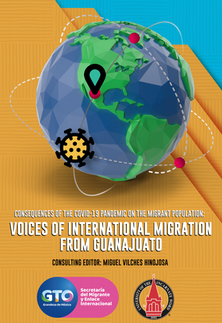 The Lewis Center is pleased to announce the release of the English version of this compilation of essays that provide expert perspectives and insight into the impact of the COVID-19 pandemic on migrant populations. We would like to thank Dr. Gabriel Saxton-Ruiz of UIW’s College of Humanities, Arts and Social Sciences, for serving as our translator. Also we express our gratitude to the Ministry of Migrant and International Affairs of the State of Guanajuato (Secretaría del Migrante y Enlace Internacional) for the opportunity to collaborate, for their continued service to immigrants in need, and for their continued commitment to the discovery of truth.
The Lewis Center is pleased to announce the release of the English version of this compilation of essays that provide expert perspectives and insight into the impact of the COVID-19 pandemic on migrant populations. We would like to thank Dr. Gabriel Saxton-Ruiz of UIW’s College of Humanities, Arts and Social Sciences, for serving as our translator. Also we express our gratitude to the Ministry of Migrant and International Affairs of the State of Guanajuato (Secretaría del Migrante y Enlace Internacional) for the opportunity to collaborate, for their continued service to immigrants in need, and for their continued commitment to the discovery of truth.
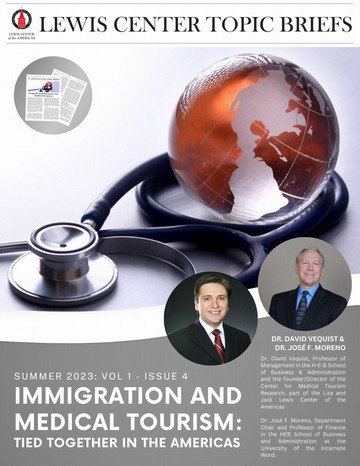 Dr. David George Vequist IV and Dr. José F. Moreno of the HEB School of Business and Administration at the University of the Incarnate Word are the authors of this Summer 2023 issue of the Lewis Center Topic Briefs. The issue focuses on the relationship between immigration and medical tourism in the Americas and is available by clicking below.
Dr. David George Vequist IV and Dr. José F. Moreno of the HEB School of Business and Administration at the University of the Incarnate Word are the authors of this Summer 2023 issue of the Lewis Center Topic Briefs. The issue focuses on the relationship between immigration and medical tourism in the Americas and is available by clicking below.
Immigration and Medical Tourism: Tied Together in the Americas (pdf)
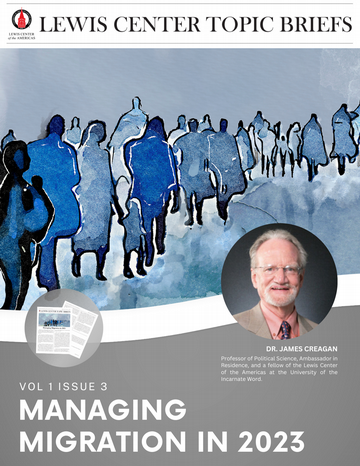 Dr. James Creagan, Professor of Political Science, Ambassador in Residence, and a fellow of the Lewis Center of the Americas at the University of the Incarnate Word, is the author of this Spring 2023 issue No. 3 of the Lewis Center Topic Briefs. The issue focuses on the topic of managing migration in 2023 and is available by clicking below.
Dr. James Creagan, Professor of Political Science, Ambassador in Residence, and a fellow of the Lewis Center of the Americas at the University of the Incarnate Word, is the author of this Spring 2023 issue No. 3 of the Lewis Center Topic Briefs. The issue focuses on the topic of managing migration in 2023 and is available by clicking below.
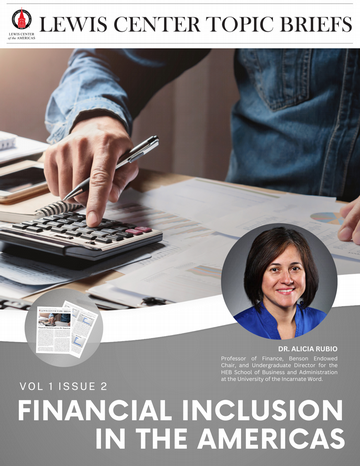 Dr. Alicia Rubio, Professor of Finance, Benson Endowed Chair, and Undergraduate Director for the HEB School of Business and Administration at the University of the Incarnate Word, is the author of this Spring 2023 issue No. 2 of the Lewis Center Topic Briefs. The issue focuses on the topic of financial inclusion across the Americas and is available by clicking below.
Dr. Alicia Rubio, Professor of Finance, Benson Endowed Chair, and Undergraduate Director for the HEB School of Business and Administration at the University of the Incarnate Word, is the author of this Spring 2023 issue No. 2 of the Lewis Center Topic Briefs. The issue focuses on the topic of financial inclusion across the Americas and is available by clicking below.
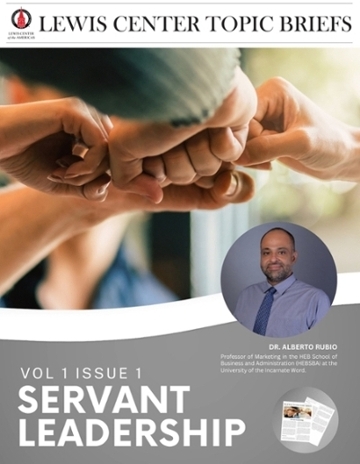
Dr. Alberto Rubio, Professor of Marketing at the University of the Incarnate Word’s HEB School of Business, is the author of this Spring 2023 inaugural issue of the Lewis Center Topic Briefs. The issue focuses on the topic of servant leadership and is available by clicking below.
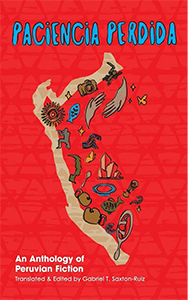 Edited and translated by Dr. Gabriel Saxton-Ruiz, Paciencia Perdida is an anthology of short stories from some of Perú’s most renowned contemporary authors. In the words of Alejandro Neyra, Perú’s former Minister of Culture, “Paciencia Perdida does not make you lose your patience at all. Entering this kaleidoscope of contemporary Peruvian literature is an adventure and a risk. Lose yourself into this labyrinth and I am sure you will continue exploring our country’s new voices. Like most Peruvians, you will simultaneously enjoy and suffer as you start to identify with authentic experiences from Perú.” Dr. Saxton-Ruiz is a Latin American Culture and Literature Professor in the College of Humanities, Arts and Social Sciences at the University of the Incarnate Word (UIW) and an active member of UIW’s Lewis Center faculty network.
Edited and translated by Dr. Gabriel Saxton-Ruiz, Paciencia Perdida is an anthology of short stories from some of Perú’s most renowned contemporary authors. In the words of Alejandro Neyra, Perú’s former Minister of Culture, “Paciencia Perdida does not make you lose your patience at all. Entering this kaleidoscope of contemporary Peruvian literature is an adventure and a risk. Lose yourself into this labyrinth and I am sure you will continue exploring our country’s new voices. Like most Peruvians, you will simultaneously enjoy and suffer as you start to identify with authentic experiences from Perú.” Dr. Saxton-Ruiz is a Latin American Culture and Literature Professor in the College of Humanities, Arts and Social Sciences at the University of the Incarnate Word (UIW) and an active member of UIW’s Lewis Center faculty network.
Paciencia Perdida is available through numerous booksellers including Barnes and Noble, Amazon and Goodreads.
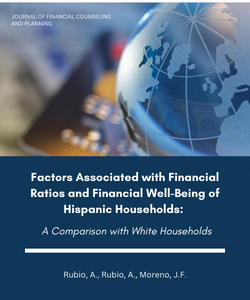 Using data from the 2016 Survey of Consumer Finances (SCF) and the Family Life Cycle (FLC) and Human Capital Theory (HCT) as a framework, this study examined if factors related to the likelihood of financial ratio adequacy and financial well-being differ for Hispanic and non-Hispanic White households. Hispanics’ comprehensive financial well-being was assessed with three ratios: Liquidity, solvency, and investments/assets. Results of logistic regressions with 612 Hispanic and 4,481 non-Hispanic-headed households show that FLC and HCT factors are associated with financial ratios differently between two race/ethnicity groups. For Hispanic households, age is positively related to adequate investment/assets ratio and financial well-being; education is positively related to adequate investment/assets but negatively related to adequate solvency. Implications for practitioners working with Hispanics are discussed.
Using data from the 2016 Survey of Consumer Finances (SCF) and the Family Life Cycle (FLC) and Human Capital Theory (HCT) as a framework, this study examined if factors related to the likelihood of financial ratio adequacy and financial well-being differ for Hispanic and non-Hispanic White households. Hispanics’ comprehensive financial well-being was assessed with three ratios: Liquidity, solvency, and investments/assets. Results of logistic regressions with 612 Hispanic and 4,481 non-Hispanic-headed households show that FLC and HCT factors are associated with financial ratios differently between two race/ethnicity groups. For Hispanic households, age is positively related to adequate investment/assets ratio and financial well-being; education is positively related to adequate investment/assets but negatively related to adequate solvency. Implications for practitioners working with Hispanics are discussed.
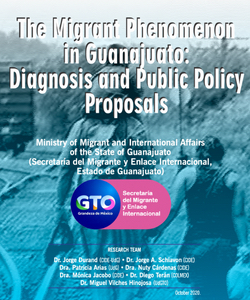 The University of the Incarnate Word is pleased to support the production of The Migrant Phenomenon in Guanajuato: Diagnosis and Public Policy Proposals by sponsoring the printing and distribution of the study’s English language version. We are grateful for the opportunity to collaborate with the State of Guanajuato, the Centro de Investigación y Docencia Económicas (CIDE) and Konrad-Adenauer-Stiftung (KAS-México), and we thank them for their dedication, expertise and commitment to the discovery of truth.
The University of the Incarnate Word is pleased to support the production of The Migrant Phenomenon in Guanajuato: Diagnosis and Public Policy Proposals by sponsoring the printing and distribution of the study’s English language version. We are grateful for the opportunity to collaborate with the State of Guanajuato, the Centro de Investigación y Docencia Económicas (CIDE) and Konrad-Adenauer-Stiftung (KAS-México), and we thank them for their dedication, expertise and commitment to the discovery of truth.
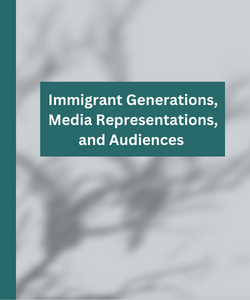 Dr. Zazil Reyes, Associate Professor and the Director of Communication Arts ABM Programs recently published an article based on the two contemporary shows namely Jane the Virgin (JTV) and One Day at a Time (ODAAT) that have disrupted a traditional media landscape that has largely overlooked Latina/o/x immigrants. Both shows reflect the burgeoning Latina/o/x viewership and embody the changing nature of the available representations by centering Latina/o/x immigrants, including those who are undocumented. This chapter examines the immigration narratives represented in these shows. We argue that JTV and ODAAT aim to normalize Latina/o/x families as American families without erasing their Latinidad. More concretely, we examine how JTV and ODAAT address three main themes: (1) Different pathways to residency/citizenship, (2) the experience of being undocumented, and (3) political consciousness and activism in relation to immigration. Through these themes, JTV and ODAAT expand beyond the problematic dominant discourse of Latinx migrants.
Dr. Zazil Reyes, Associate Professor and the Director of Communication Arts ABM Programs recently published an article based on the two contemporary shows namely Jane the Virgin (JTV) and One Day at a Time (ODAAT) that have disrupted a traditional media landscape that has largely overlooked Latina/o/x immigrants. Both shows reflect the burgeoning Latina/o/x viewership and embody the changing nature of the available representations by centering Latina/o/x immigrants, including those who are undocumented. This chapter examines the immigration narratives represented in these shows. We argue that JTV and ODAAT aim to normalize Latina/o/x families as American families without erasing their Latinidad. More concretely, we examine how JTV and ODAAT address three main themes: (1) Different pathways to residency/citizenship, (2) the experience of being undocumented, and (3) political consciousness and activism in relation to immigration. Through these themes, JTV and ODAAT expand beyond the problematic dominant discourse of Latinx migrants.

Dr. Teresa Harrison, Associate Professor of Management and coordinator of the Management department in the H-E-B School of Business and Administration (HEBSBA), recently published an article in Research in Personnel and Human Resources Management (Vol. 39), a publication promoting the theory and research on the field of human resources management. This publication is considered by some as one of the best assets for human resources management research.
“The immigrant journey into the workplace often means a tremendous loss in status (legally or perceived), which can lead to negative reactions in the workplace,” said Harrison. “Immigrants many times give up very distinctive markers that they had in their home countries (advanced education/degrees, status of their family names, etc.), which may not be valued in the destination country. By studying immigrant experiences in the destination countries and workplaces, we can better understand how they navigate various cultures and reconcile those cultures with their own identity, as well as how they encounter pathways or roadblocks to their workplace and, by extension, their livelihood. This ultimately enables us to understand how to better facilitate a positive transition into the workplace and to promote diversity and inclusion in organizations.”
Harrison’s article, "HRM Challenges for Immigrant Employees: Status-Laden Transitions Across Cultures and Workplace Social Environments," is co-authored by Dr. David A. Harrison and Dr. Margaret A. Shaffer. David Harrison is the University of Texas at Austin’s Charles and Elizabeth Prothro Regents Chair of Business Administration, Department of Management, and Shaffer hails from the University of Oklahoma’s Price College of Business Management and International Business. Their research focused on the status categories assigned to immigrants after they reach their destination.
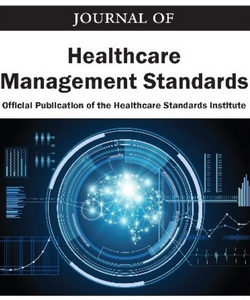 Dr. David George Vequist IV, Professor of Management in the H-E-B School of Business & Administration and the Founder/Director of the Center for Medical Tourism Research has recently published a study that attempted to measure the impact of a lack of standard continuity on the healthcare outcomes by comparing self-reported perceptions of health among a large population of people that traveled across borders. These travelers, without a discernible continuum of care, were surveyed before and after travel. A statistical analysis of self-reported perception data about general health before and after cross-border travel shows a significant decrease in overall health after cross-border travel. Despite some limitations, a moderate amount of the decline can be attributed to the breakdown of the continuum of care between providers on both sides of the border. The development of standards for cross-border healthcare could potentially improve the healthcare received by migrants and medical travelers.
Dr. David George Vequist IV, Professor of Management in the H-E-B School of Business & Administration and the Founder/Director of the Center for Medical Tourism Research has recently published a study that attempted to measure the impact of a lack of standard continuity on the healthcare outcomes by comparing self-reported perceptions of health among a large population of people that traveled across borders. These travelers, without a discernible continuum of care, were surveyed before and after travel. A statistical analysis of self-reported perception data about general health before and after cross-border travel shows a significant decrease in overall health after cross-border travel. Despite some limitations, a moderate amount of the decline can be attributed to the breakdown of the continuum of care between providers on both sides of the border. The development of standards for cross-border healthcare could potentially improve the healthcare received by migrants and medical travelers.
 Dr. David George Vequist IV, Professor of Management in the H-E-B School of Business and Administration and the Founder/Director of the Center for Medical Tourism Research has recently published a study on international hospital accreditation and its impact on clinical standards and bed occupancy rates. It was expected, prior to the study, that participating in international accreditation might increase operational expenses and greater amounts of international patients would also boost patient volumes and profitability. However, this research found that the investment in accreditation led to insignificant changes (pre-accreditation versus post-accreditation) in operating profit margins (OPM), net profit margins (NPM), and the debt-to-equity (D/E) ratio. This suggests that international hospital accreditation has little impact on the financial aspects of the hospital’s operations. It appears to be more of a signaling strategy than a recipe for growth. However, there may be some other tangible benefits of international accreditation (e.g., better medical/clinical outcomes).
Dr. David George Vequist IV, Professor of Management in the H-E-B School of Business and Administration and the Founder/Director of the Center for Medical Tourism Research has recently published a study on international hospital accreditation and its impact on clinical standards and bed occupancy rates. It was expected, prior to the study, that participating in international accreditation might increase operational expenses and greater amounts of international patients would also boost patient volumes and profitability. However, this research found that the investment in accreditation led to insignificant changes (pre-accreditation versus post-accreditation) in operating profit margins (OPM), net profit margins (NPM), and the debt-to-equity (D/E) ratio. This suggests that international hospital accreditation has little impact on the financial aspects of the hospital’s operations. It appears to be more of a signaling strategy than a recipe for growth. However, there may be some other tangible benefits of international accreditation (e.g., better medical/clinical outcomes).

